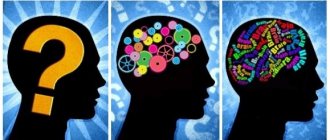Panic attacks are often accompanied by severe fears associated with various incomprehensible and frightening sensations during an attack. A person often experiences fear that he will die. Is it possible to die during a panic attack or go crazy? You will find the answer to this question in this article.
During a panic attack, a person assesses the situation as life-threatening and puts the body into extreme mode, releasing adrenaline into the blood, which causes different sensations and symptoms at this moment. Since the symptoms are unusual, they begin to scare me that something is wrong with me. This fear is not justified, there is nothing wrong with your health, and the symptoms are a normal physiological reaction that occurs in any person in case of serious danger. When adrenaline is released, the body is put into a mode capable of withstanding heavy physical exertion, the heartbeat increases so that the blood carries oxygen faster and breathing increases so that there is more oxygen in the blood. Increased breathing leads to hyperventilation - an excess of oxygen. Symptoms of hyperventilation: chest discomfort, numbness and tingling in the extremities, tightness in the temples, tinnitus, blurred vision and dizziness.
Fear for the heart during a panic attack
An increased heart rate during fear or physical activity is a normal physiological reaction. The heart is naturally designed to withstand very heavy loads. Below is a table with approximate heart rate (pulse) data, depending on the fitness level of the person and his age.
As can be seen from the table, for a professional thirty-year-old athlete at maximum load, a pulse of 186 is the norm, and the athlete experiences such a load at least five times a week for many years. Well, a pulse above 200 is also not uncommon for an athlete. As you can see, the load on the heart is simply enormous. Now let's look at the statistics: out of twenty thousand professional athletes a year, one dies due to a heart-related problem (often death is associated with doping). For comparison, approximately one in 5,000 people die from road accidents per year, which is not difficult to calculate, four times more often. Therefore, increasing your heart rate can be treated as a useful workout for your heart. Remember that your workload on your heart is much less than that of professional athletes, even if you have panic attacks every day.
Causes
People suffering from PA do not even try to see a doctor. There are many reasons, the main one being the lack of reliable information about the disease. Half of patients think that uncontrollable panic attacks are a serious mental illness - they are deeply mistaken. Others try to come to terms with it, underestimating its seriousness, and try to recover with the help of folk remedies. But the true nature of PA is not known to many; some do not even know what a panic attack is or whether it is dangerous.
Psychiatrists, psychologists and psychotherapists have not come to a consensus on the reasons why PA occurs. It was found that PA is accompanied by certain changes in the nervous system. They are associated with improper metabolism of neurotransmitters:
- norepinephrine;
- serotonin;
- adrenaline.
If their exchange is disrupted, PA occurs, and when the attack passes, a strange state is observed after panic attacks.
Important! You may never find the cause of a panic attack!
Scientists put forward various theories and hypotheses about the causes of PA, but experts are unequivocally confident that they arise due to stress.
The main causes of panic attacks:
- Genetic predisposition. Many are sure that people suffering from the disease have close relatives with the same symptoms.
- Intrapersonal conflict. In women, this condition is observed more often than in men, since the weaker sex accumulates negative factors, which ultimately result in an anxious state.
- Cognitive theory states that feelings of panic are caused by overinterpretation of one's own sensations. This applies to overly sensitive people.
- Adherents of the behavioral theory are simply confident that fears are inextricably linked with external factors.
No one can give an exact answer, there are only guesses. Unreasonable panic can result from the development of thyroid diseases. Panic haunts people who abuse alcohol and drugs. Often, attacks occur at a time when neurosis or vegetative-vascular dystonia worsens.
Fear of high blood pressure during a panic attack
When adrenaline is released into the circulatory system, the pulse and blood flow increase, and all this together leads to an increase in blood pressure. It is considered normal that the pressure rises by 25% of the resting state. Those. If your resting blood pressure is 120, then it is absolutely normal for it to be 150 when you panic, and this does not mean that you have hypertension. Hypertension is increased blood pressure at rest, and not during a state of panic or exercise. Below is a table of the degree of hypertension.
Your logic automatically assumes the worst every time you encounter the unknown.
- When logic encounters something new and unknown , it begins to play scary pictures in its head. This has been preserved since the times of the caveman.
- When faced with the unknown, the “fight” or “flight” instincts are triggered. You should know everything about how to stop worrying about a fight, even if it doesn't happen.
- Once again, logic is not your friend . There is no need to follow logic.
- Here you need to realize that where there is the unknown, there is life and bloom . And in the comfort zone there is stunting. There is no need to run away from life.
- Just like, for example, a river always flows and life is always seething in it . And the pond can become a swamp and wither away lifelessly.
Understand this and realize it, and you will no longer wonder about how to deal with panic attacks yourself.
Can high blood pressure during a panic attack lead to a heart attack or stroke?
With age, atherosclerotic plaques form on the walls of blood vessels, and if the plaque comes off, then the vessel can rupture in this place and this is called a stroke, or the detached plaque can clog the vessel and this is called a heart attack. But for this to happen, two main conditions must be met.
- These atherosclerotic plaques must exist, but they form either with age, or as a result of obesity, or as a result of certain diseases. The age that falls into the risk zone is from 55 years for men and from 65 years for women.
- Blood pressure surges should be above 180 If both of these conditions are met, then the chance of having a stroke or heart attack within one year of life is 1-2%
Thus, high blood pressure (over 180) does increase the risk of heart attack or stroke by 1-2%, provided you have atherosclerotic plaques (atherosclerosis). And if you are under 55 years old, and are not severely obese, then in the vast majority of cases you simply do not have atherosclerosis, then high blood pressure is not dangerous for you.
Fear of fainting during a panic attack
Conventionally, two types of fainting can be distinguished. In the first case, fainting occurs for physiological reasons, in the second for psychological reasons. In the first option, blood circulation in the brain worsens, oxygen starvation occurs and the brain “turns off”; this can occur as a result of overwork, or illness, or lack of oxygen or lack of glucose (hypoglycemia). In such cases, fainting is preceded by a state of severe weakness, low blood pressure, and low tone. During a panic attack, the opposite is true: the pressure is high, the blood circulation in the brain is very good, there is a good supply of oxygen to the brain, so from the physiological side there is no threat of fainting.
The second option for fainting is fainting caused by a reaction to some kind of stress. Fainting occurs for psychological reasons. Figuratively speaking, it is very difficult for a person to withstand some kind of stress, and therefore he “switches off”. This reaction to stress is very individual and quite rare. And if it exists, then the person knows about it, because he has already experienced it before, i.e. I fainted from some kind of stress. Thus, if you have never fainted as a result of stress in your life, then you do not have such a reaction to stress, and this type of fainting does not threaten you. And the person, that rare person, who has this reaction to stress will most likely faint before panic develops.
During a panic attack, under the influence of adrenaline, the heartbeat and breathing rate increase, which very often leads to hyperventilation, i.e. oversaturation of the brain with oxygen. As a result, dizziness may occur and a person may mistakenly perceive this as fainting. In addition, in a state of panic there will be confusion of thoughts and difficulty concentrating, which can also be mistakenly perceived as a pre-fainting state. Also, due to high blood pressure and difficulty concentrating, blurred vision may occur; this also has absolutely nothing to do with the pre-fainting state.
To summarize, you are not in danger of fainting during a panic attack. In my many years of work experience, I have never heard of such a case (psychologist Evgeny Vedernikov).
Fear of going crazy during a panic attack
Our psyche is able to “digest” even very strong fear, otherwise our world would be full of crazy people. People would have mental disorders from watching horror movies, or after extreme situations, such as after severe accidents. And what happened before, when times were harsher and there was much more danger than in our days, for example in primitive times, everyone there would have gone crazy with fear. The fear that I might go crazy usually results from confusion and difficulty concentrating during a panic attack. But this is an absolutely normal state of a person in a moment of panic. In a moment of panic, you don’t need to think, you need to act, this is how we are programmed by nature, if we think, we will waste time and the chances of survival will be lower. Thus, it is absolutely normal to think poorly during a panic.
It is also a common misconception that during a panic attack I will behave strangely and people will think that I am inadequate. This misconception also usually arises due to confusion at the moment of panic. In fact, during a panic, people do not do anything stupid; all actions at this moment are aimed at avoiding danger. From the outside, it simply looks like a person is very worried about something, or scared of something. The usual desire of the observer is to somehow help the person calm down, for example, give a glass of water or a pill. Nowadays, a panic attack won’t really surprise anyone, and most people know what it is and react normally to it.
Also, thoughts about the instability of one’s mental state are often caused by derealization at the time of a panic attack. Derealization is a natural defensive reaction of the psyche to some kind of stress, a feeling that everything is not happening for real, like in a dream. The task of derealization is to distance yourself from stress, because experiencing severe stress is very difficult. And finding themselves in this state “like in a dream,” many people think that they are going crazy and, accordingly, are very frightened by this prospect. In fact, derealization is an absolutely healthy reaction to stress, and it goes away on its own, without any consequences for the psyche, when the stress subsides.
Act contrary to the thoughts that cause suffering and do not identify yourself with them
- If thoughts appear and make you worry , do everything against them and do not follow them. Even if some excuses come up and it seems strange to you, still act contrary to the restless thoughts.
- These thoughts are not yours and should not be considered yours . Because they make you feel bad about yourself.
- Do not identify yourself with thoughts , and you will always know what to do with panic attacks during the next outbreak.
During a panic attack, there is not enough air, and it’s hard to breathe; is it possible to suffocate?
The feeling of lack of air is false and caused by adrenaline; in fact, there is an excess of oxygen in the blood, and it is better, on the contrary, to try to slow down your breathing or hold your breath or breathe into the bag. Then you will reduce the amount of oxygen in the blood and thereby calm down a little. Also, sometimes there is a psychological effect that, out of fear of suffocation, a person tries to inhale more air, while forgetting to exhale the old one. It is not life-threatening because breathing is an automatic process and the body will not allow you to suffocate. But for this feeling to go away, it is advisable, on the contrary, to focus not on inhalation, but on exhalation. Lengthen the exhalation and make it deeper. Try not to inhale more air, but exhale the old one.
So, can you die from a panic attack or go crazy? As you can see, fears that you will somehow suffer from panic attacks are not justified. Panic attacks are simply a state of panic that any person will experience if they find themselves in an extreme situation. These experiences are difficult and unpleasant, but not dangerous to health or psyche. To make it easier to survive a panic attack, use the recommendations in this article.










